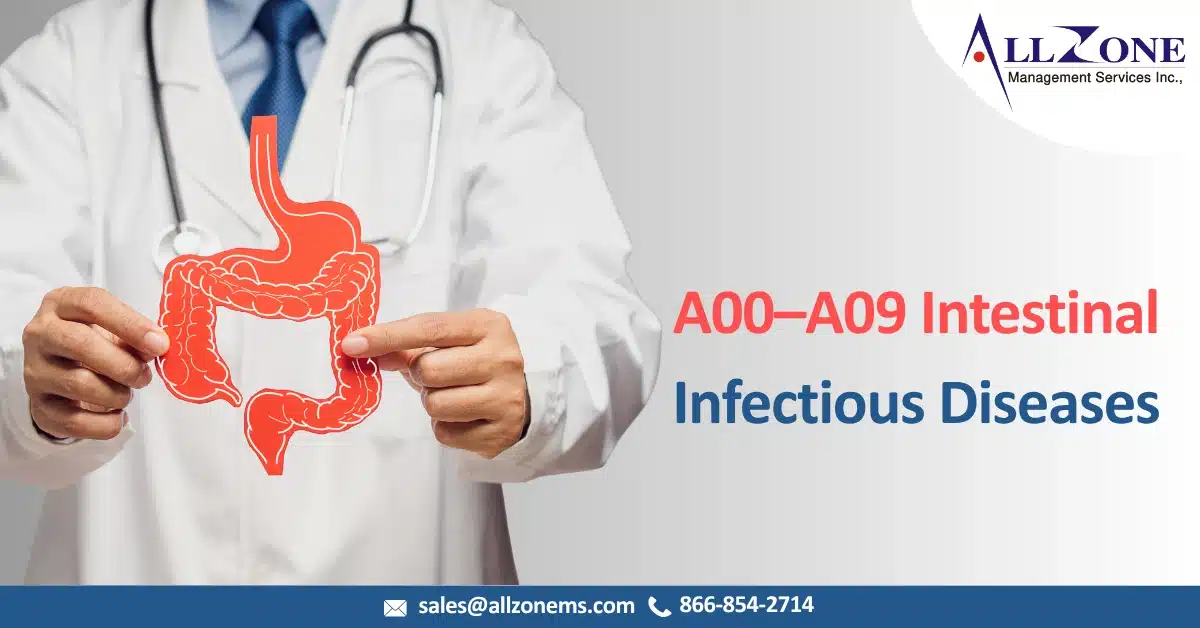Intestinal infectious diseases remain one of the most commonly reported medical conditions worldwide, leading to millions of outpatient visits and significant healthcare spending each year. In the ICD-10-CM code range A00–A09, these conditions include cholera, typhoid fever, shigellosis, foodborne illnesses, viral gastroenteritis, and other bacterial, viral, and parasitic infections affecting the digestive tract. Accurate coding in this category is essential for correct reimbursement, improved clinical documentation, public health reporting, and reducing claim denials.
For practices, hospitals, and medical coding companies, staying updated with ICD-10 changes and ensuring proper usage of A00–A09 codes is crucial. In this guide, Allzone breaks down everything providers need to know—diagnosis definitions, coding guidelines, documentation requirements, and RCM best practices to optimize reimbursements.
Understanding ICD-10-CM Codes A00–A09: What Do They Cover?
The ICD-10-CM block A00–A09 includes:
- A00 – Cholera
- A01 – Typhoid and paratyphoid fevers
- A02 – Other salmonella infections
- A03 – Shigellosis
- A04 – Other bacterial intestinal infections
- A05 – Other bacterial foodborne intoxications
- A06 – Amebiasis
- A07 – Other protozoal intestinal diseases
- A08 – Viral and other specified intestinal infections
- A09 – Infectious gastroenteritis and colitis, unspecified
These codes capture a wide variety of infections transmitted through contaminated food, water, or person-to-person contact. Because many of these conditions have overlapping symptoms—like diarrhea, vomiting, fever, and abdominal pain—accurate diagnosis and lab confirmation are key to assigning the correct code.
Why Accurate Coding for A00–A09 Matters
Coding intestinal infectious diseases correctly is more than a compliance requirement—it directly impacts:
- Reimbursement Accuracy: Incorrect codes often lead to claim denials, improper payments, or audits. Payers require specific details such as organism type, exposure, and severity.
- Public Health Reporting: Many intestinal infections, such as cholera, salmonella, and shigellosis, are notifiable diseases. Proper coding ensures accurate epidemiological surveillance.
- Clinical Documentation Integrity (CDI): Correctly coded data supports continuity of care, risk adjustment, and medical necessity justification.
- Reduced Claim Denials: A major portion of denials arises from vague or incomplete documentation. Allzone’s RCM experts emphasize that complete clinical details can reduce denial rates significantly.
Common Conditions and Key Coding Notes in A00–A09
Here is a breakdown of frequently used codes and guidelines that medical coders must follow:
A00 – Cholera
Cholera due to Vibrio cholerae is rare in developed nations but still reported. Coders should ensure:
- Lab confirmation (if available)
- Exposure history (contaminated water, travel)
A02 – Salmonella Infections
Includes:
- A02.0 – Salmonella enteritis
- A02.1 – Salmonella sepsis
- A02.2 – Salmonella meningitis
Documentation must specify the type and any complications.
A03 – Shigellosis
Codes require organism detail:
- A03.0 – Shigella dysenteriae
- A03.1 – Shigella flexneri
- A03.2 – Shigella boydii
- A03.3 – Shigella sonnei
A04 – Other Bacterial Intestinal Infections
Examples:
- A04.0 – Enteropathogenic E. coli infection
- A04.7 – Enterocolitis due to Clostridium difficile
(Now more commonly coded as C. diff infection)
A08 – Viral Intestinal Infections: Includes rotavirus, norovirus, adenovirus, and sapovirus.
A09 – Infectious Gastroenteritis, Unspecified: Used when the etiology is not documented or unknown. Coders should avoid overusing A09, as unspecified codes often trigger payer scrutiny.
Documentation Requirements for Accurate A00–A09 Coding
To ensure proper ICD-10 coding and billing, clinical documentation must include:
- Identified Organism: Example: Rotavirus, Salmonella, Shigella, E. coli, C. difficile.
- Source & Transmission: Foodborne, waterborne, travel-related, or contaminated surfaces.
- Severity: Mild, moderate, severe, dehydration present or absent.
- Complications: Such as sepsis, dehydration, electrolyte imbalance, or hospitalization.
- Confirmatory Lab Results: Stool culture, PCR, antigen testing.
- Treatment Approach: IV fluids, antibiotics, antiprotozoals, hospitalization.
Coders should always query the provider when documentation is unclear or insufficient.
Challenges in Coding Intestinal Infectious Diseases
- Unspecified Organism: Many providers document only “gastroenteritis,” resulting in generic codes. Queries are essential.
- Missing Lab Confirmation: Labs may be pending, but for coding purposes, providers must document a suspected or ruled-out diagnosis clearly.
- Overuse of A09: Payers may downgrade or reject claims with generic diagnoses.
- Misclassification of Food Poisoning vs. Gastroenteritis: Food poisoning often falls under A05, not A08 or A09.
Billing and Reimbursement Considerations for A00–A09 Codes
To ensure smooth reimbursement, healthcare organizations should follow these best practices:
- Verify Medical Necessity: Payers may require proof of symptoms, dehydration, or abnormal labs.
- Link ICD-10 Codes with Correct CPT/HCPCS Codes
Common combinations include:
- E/M codes (99202–99215)
- IV hydration codes
- Lab testing codes (stool studies)
- Observation or inpatient codes
- Avoid Cloning or Copy-Paste Errors: Each note must reflect the patient’s unique condition and visit details.
- Use Precise and Detailed Clinical Notes: Detailed documentation helps justify higher-level E/M services.
- Conduct Regular Coding Audits: Allzone recommends monthly audits to identify recurring errors and prevent revenue leakage.
How Allzone Improves Accuracy in A00–A09 Coding and RCM Workflows
As a trusted medical billing and coding partner, Allzone helps healthcare organizations streamline coding accuracy and reduce denials for intestinal infectious disease claims through:
- Expert ICD-10 Coding Support: Our certified coders stay updated with CDC, WHO, and CMS guidelines.
- AI-Enhanced Documentation Review: Advanced tools identify gaps, missing organisms, and incorrect classifications.
- Denial Management & Prevention: We analyze root causes and fix coding, modifier, and documentation issues.
- End-to-End RCM Services: From eligibility checks and claim submission to payment posting, Allzone ensures faster reimbursements.
- Customized Training for Providers: Training sessions to educate clinicians on documentation best practices for infectious diseases.
Conclusion
The ICD-10-CM code range A00–A09: Intestinal Infectious Diseases plays a critical role in accurate diagnosis reporting, claim submission, and public health surveillance. Proper documentation and precise code selection help prevent denials, ensure timely payments, and support high-quality care. With the right RCM partner like Allzone, healthcare providers can enhance accuracy, reduce administrative burden, and maintain compliance while focusing on patient care.
If you need assistance with ICD-10 coding, denial management, or full-service medical billing, Allzone is here to help.

